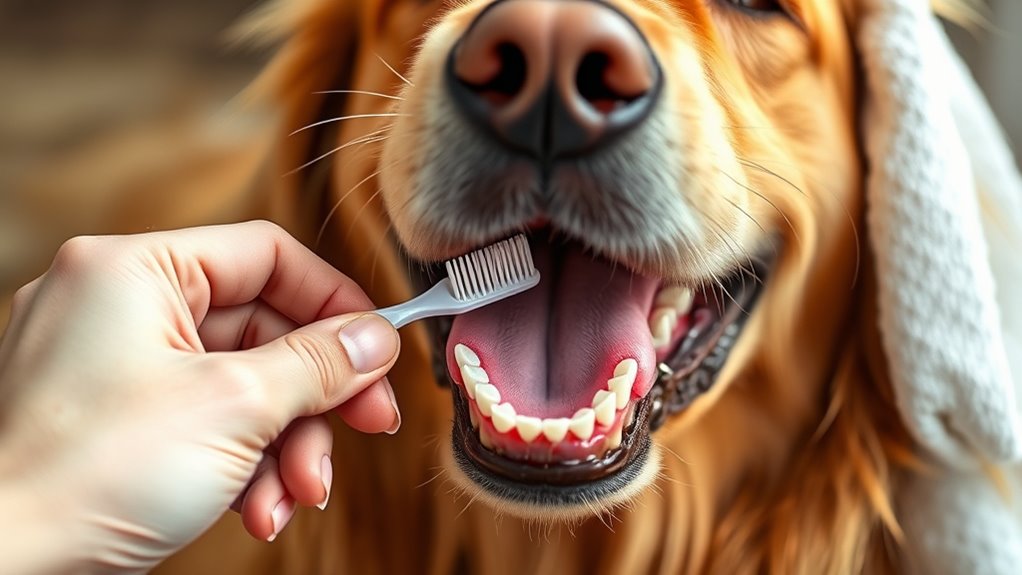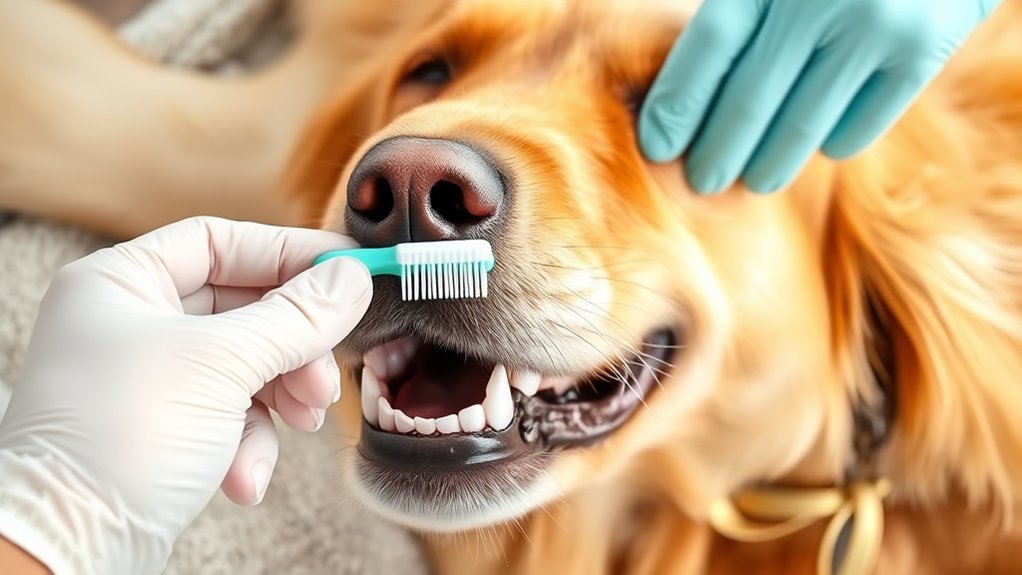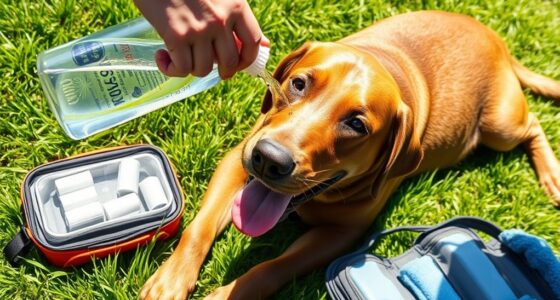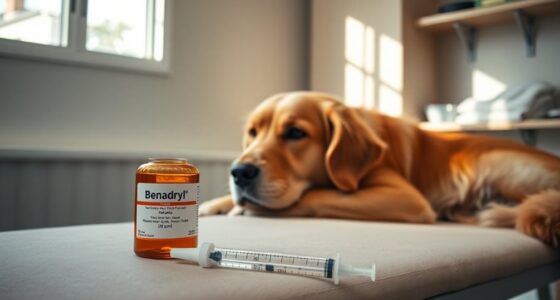A canine dental care routine is key to keeping your dog’s teeth healthy and gums strong. Start by providing safe chew toys to soothe teething discomfort and reduce destructive chewing. Brush your dog’s teeth several times a week with dog-specific toothpaste, using positive reinforcement. Schedule regular professional checkups to catch issues early. Consistency in daily care and vet visits will improve your dog’s overall health and happiness—if you keep going, you’ll discover even more ways to support their dental well-being.
Key Takeaways
- Implement daily or several times weekly brushing with dog-specific toothpaste and toothbrush.
- Provide safe, durable dental chew toys to soothe gums and promote oral health.
- Schedule regular veterinary dental checkups and professional cleanings for early issue detection.
- Monitor your dog’s oral health, watching for bad breath, drooling, or discomfort.
- Incorporate dental care into your pet’s routine to prevent plaque buildup, infections, and promote overall well-being.

Maintaining a proper canine dental care routine is essential for your dog’s overall health and well-being. One of the first challenges you’ll face is managing teething discomfort, especially if your puppy is just starting to lose baby teeth. During this period, your dog might chew more than usual, drool excessively, or seem a bit irritable. Providing appropriate outlets for this natural process is crucial. Dental chew toys are a fantastic solution—they help soothe sore gums and reduce the urge to chew on furniture or shoes. Look for specially designed chew toys that are durable, safe, and made for teething puppies. These toys not only alleviate discomfort but also support healthy dental development, helping to prevent future dental issues.
Teething puppies benefit from durable, safe chew toys that soothe gums and promote healthy dental development.
When your dog is teething, it’s tempting to give them anything they want to chew on, but not all objects are safe. Avoid giving them items that could splinter or break into sharp pieces, which could cause internal injuries or choking. Instead, opt for dental chew toys that are specifically designed to be gentle on gums yet tough enough to withstand their chewing strength. These toys often have textured surfaces, which can massage gums and help remove plaque. Incorporating these toys into your routine can also teach your dog healthy habits early on, making dental care less of a chore later in life.
As your dog grows, establishing a regular cleaning routine becomes even more important. Brushing their teeth daily or at least several times a week helps prevent plaque buildup, which can lead to tartar, bad breath, and periodontal disease. Use a toothbrush and toothpaste formulated specifically for dogs—human toothpaste can be harmful to them. When introducing brushing, do so gradually, making the experience positive with praise and treats. Over time, your dog will associate dental care with good things, making the process smoother and more effective.
Don’t forget to supplement brushing with professional dental checkups. Your veterinarian can assess your dog’s oral health and perform cleanings that are difficult to achieve at home. Regular dental visits, combined with consistent at-home care, ensure your dog maintains healthy teeth and gums for years to come. Remember, a good dental routine isn’t just about fresh breath; it’s a vital part of your dog’s overall health, preventing painful infections and supporting their quality of life. Incorporating dental health into your routine can significantly improve your pet’s longevity and happiness. By prioritizing these steps, you’re helping your furry friend stay happy, healthy, and comfortable every day.
Frequently Asked Questions
How Often Should I Replace My Dog’s Toothbrush?
You should replace your dog’s toothbrush every 3 to 4 months to maintain ideal dog dental hygiene. Regularly changing the toothbrush ensures the toothbrush lifespan doesn’t diminish, preventing bacteria buildup and ineffective cleaning. If your dog’s toothbrush shows signs of wear sooner, like frayed bristles or difficulty cleaning, replace it immediately. Consistent toothbrush updates help keep your dog’s teeth healthy and reduce the risk of dental issues.
Are Dental Treats as Effective as Brushing?
Think of dental treats as a tasty aid, but they’re not a substitute for brushing effectiveness. While treats can help reduce plaque and freshen breath, they don’t clean teeth as thoroughly as brushing does. You need to actively scrub away plaque with a toothbrush, reaching every surface. Combining both guarantees your dog’s teeth stay healthy, but never rely solely on dental treats for complete oral care.
Can Dental Disease Affect My Dog’s Overall Health?
Yes, dental disease can affect your dog’s overall health. Poor oral hygiene can lead to gingivitis prevention issues and allow bacteria to enter the bloodstream, impacting systemic health links like heart, liver, and kidney problems. Regular dental care, including brushing and professional cleanings, helps prevent these issues, ensuring your dog stays healthy and happy. Don’t overlook dental health—it’s essential for their overall well-being.
When Should I Start Dental Care for My Puppy?
A stitch in time saves nine, so start dental care early. You should begin a puppy teething and dental cleaning schedule as soon as you bring your puppy home. Gently introduce tooth brushing and dental chews during this period to prevent future issues. Early habits make a big difference, and establishing a routine now helps your puppy develop healthy teeth and gums for a lifetime.
Are There Specific Dental Products for Different Dog Breeds?
Yes, there are breed-specific dental products designed to meet different dog breeds’ needs. Breed-specific dental needs vary because some breeds are prone to dental issues or have unique mouth structures. You should look for breed tailored dental products, like specialized brushes or chews, to effectively clean your dog’s teeth. This guarantees you’re addressing their particular dental health requirements and helping prevent problems related to their breed’s unique oral characteristics.
Conclusion
By sticking to this canine dental care routine, you’re not just brushing teeth — you’re saving your dog from a lifetime of unbearable pain, rotten teeth, and halitosis that could knock out an elephant! Imagine a world where your furry friend’s smile beams brighter than the sun, free from dental disasters. Don’t wait for a dental catastrophe to strike — take action now and give your dog the healthiest, happiest, and most radiant smile they’ll ever have!










